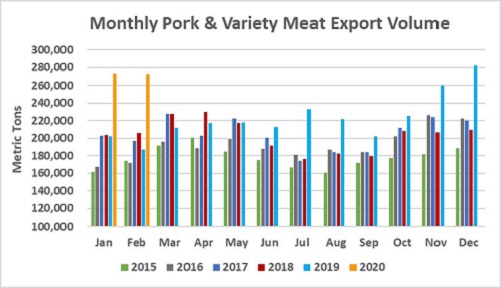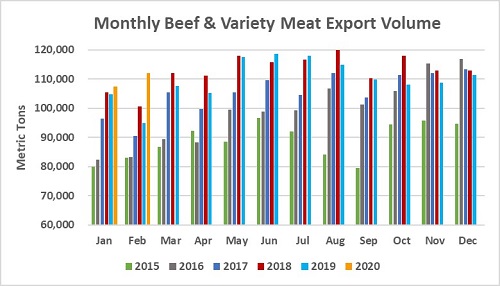US pork exports posted the third largest month on record in February, while beef exports also recorded double-digit gains from a year ago, according to data released by USDA and compiled by the US Meat Export Federation (USMEF). Through February, exports of both pork and beef are on a record pace and account for a growing share of record production.
February pork exports reached 273,056 metric tons (mt), up 46% from a year ago, valued at $726.6 million (up 59%), trailing only the volume and value totals from December 2019 and January 2020. For the first two months of the year, pork exports exceeded last year’s pace by 41% in volume (546,659 mt) and 54% in value ($1.47 billion).
Pork export value per head slaughtered was $67.77 in February, up 50% from a year ago and the highest since 2014. The January-February average was $65.02, up 45%. Exports accounted for just under 33% of total February pork production and nearly 30% for muscle cuts only, the highest on record and up substantially from last year (24% and 21%, respectively). The January-February ratios were 31.3% of total production and 28.6% for muscle cuts, up from 23.8% and 20.6%, respectively, in 2019.

US beef exports also achieved outstanding growth in February, increasing 18% from a year ago to 112,021 mt and climbing 17% in value ($681 million). These results pushed January-February volume 10% above last year’s pace at 219,395 mt and 11% higher in value ($1.35 billion).
Beef export value per head of fed slaughter was $343.03 in February, up 11% from a year ago and the highest since December 2018. The January-February average was $321.86, up 7%. Exports accounted for 15.3% of total February beef production, up from 13.9% a year ago, and 12.4% for muscle cuts only (up from 11%). Through February, exports accounted for 14.1% of total beef production and 11.5% for muscle cuts, up from 13.5% and 10.7%, respectively, last year.

Strong, Resilient Demand
With the Covid-19 pandemic dominating all news headlines, including those related to global trade, USMEF President and CEO Dan Halstrom said the February export results confirmed that global demand for high-quality protein remains strong and resilient.

“By February, Covid-19 had emerged as a major health concern in several key Asian markets and was certainly impacting consumer and business activity, so it is great to see US pork and beef exports achieve such strong growth,” stated Halstrom. “Obviously these are uncertain economic times and the road ahead remains very challenging, but these results are really a great testament to our international customer base. In the face of unprecedented obstacles, importers, retailers and restaurateurs are finding creative ways to meet consumer needs, and with record production the US industry is well positioned as a supplier. While we are in an unusual business climate that requires a lot of flexibility and innovation, there are excellent opportunities for red meat exports to continue to build momentum.”
Stronger Pork Exports to Japan, Mexico Complement China Surge
While China/Hong Kong was the largest driver of pork export growth in February, mainstay markets Japan and Mexico also posted impressive results.
February exports to China/Hong Kong were even with the huge January volume and more than tripled from a year ago to 98,847 mt, while export value more than quadrupled to $243.2 million. For the first two months of 2020, exports increased 260% from a year ago to 195,849 mt and soared by 352% in value ($488.5 million).
Pork exports to Japan totaled 35,262 mt in February, an increase of 23% year-over-year, while value climbed 28% to $145.8 million. Through February, exports increased 9% in volume (66,840 mt) and 12% in value ($278.4 million). Capitalizing on reduced duty rates, US pork is regaining market share of Japan’s imports of ground seasoned pork and chilled pork. Strong consumer demand for US chilled pork at retail and for sausages produced from ground seasoned pork underpin this growth.
In Mexico, February exports climbed 16% to 61,693 mt, while value increased 43% to $107.6 million. January-February exports to Mexico increased 11% in volume (132,153 mt) and 41% in value ($242.3 million) from the same period last year, when most US pork entering Mexico was saddled with a 20% retaliatory duty. Although weekly export data show March volumes to Mexico remained sharply higher year-over-year, the pace slowed from that seen in February, partly reflecting devaluation of the peso.

Other January-February highlights for US pork exports include:
- Exports to Canada continued to build on last year’s strong performance, increasing 18% in volume (37,364 mt) and 14% in value ($128.8 million) from a year ago.
- While the volume shipped to Oceania eased in February, value continued to increase, pushing the two-month totals 9% higher in volume to 21,831 mt and 35% above last year’s record value pace at $72.6 million.
- Strong growth in Honduras, El Salvador, Nicaragua and Costa Rica pushed exports to Central America 4% higher in volume (14,790 mt) and 19% higher in value ($38.6 million) from a year ago.
- Exports to Vietnam climbed 241% in volume to 3,007 mt and 134% in value ($6.7 million). This included a strong year-over-year increase in variety meat exports, consisting primarily of pork feet.
Beef Exports Climb in Most Major Markets
Japan, South Korea and Taiwan fueled beef export growth in February, but shipments also increased to key destinations in the Western Hemisphere, Africa and the Middle East.
February beef exports to leading market Japan increased 24% from a year ago to 27,099 mt and climbed 20% in value to $171.4 million. Through February, exports exceeded last year’s pace by 10% in volume (52,304 mt) and 7% in value ($329.5 million).
With a level tariff playing field, US beef is regaining chilled market share in Japan, boosted by Japan’s strong retail demand. On April 1, the start of the Japanese fiscal year brought another reduction in tariff rates (to 25.8% for beef muscle cuts), and the Japanese yen remains relatively strong.
Demand for US beef continued to build momentum in Korea, where February exports totaled 23,532 mt (up 33% from a year ago) valued at $167.7 million (up 32%). This pushed the two-month total 16% ahead of last year’s record pace in volume (41,326 mt) and 14% higher in value ($298.4 million). US beef is also gaining further market share in Korea, with strong retail demand and increased sales through e-commerce platforms.
Other January-February highlights for US beef sales abroad include:
- Exports to Mexico were 5% above last year’s pace at 41,862 mt, valued at $217 million (up 10%). Mexico is the largest volume market for US beef variety meat, and January-February variety meat exports climbed 16% from a year ago in both volume (18,182 mt) and value ($49.3 million).
- Exports to Taiwan, which is an especially strong destination for chilled beef cuts, were 20% above last year’s record pace in volume (10,051 mt) and 17% higher in value ($86.2 million).
- Exports to China/Hong Kong were down 16% to 12,501 mt, with value falling 8% to $111.2 million. But for mainland China specifically, exports were up 12% to 1,408 mt, valued at $10.4 million (up 4%). With access to China now expanded (as of late March), USMEF expects momentum to build for US beef in the world’s largest import market.

- Strong growth in Peru and Colombia pushed exports to South America 26% above a year ago to 4,367 mt, valued at $20.6 million (up 11%).
- Guatemala and Panama fueled export growth to Central America, where volume climbed 22% to 2,868 mt, valued at $16.4 million (up 25%).
- Strong variety meat shipments to South Africa, Gabon, Angola, Cote d’Ivoire, and Mozambique pushed exports to Africa well ahead of last year’s pace. Variety meat exports climbed 40% to 4,186 mt, valued at $3.2 million (up 37%), with livers and kidneys being the main items exported to the region. Total exports to Africa were up 37% in volume (4,226 mt) and 18% in value ($3.7 million).
February Lamb Exports Trend Lower
A steep decline in variety meat shipments to Mexico pushed February lamb exports 65% below last year in volume (476 mt) and 45% lower in value ($1.3 million). Through February, exports were down 48% in volume (1,435 mt) and 25% in value ($3.4 million). Lamb muscle cuts fared better, with January-February volume down 4% to 470 mt, valued at $2.4 million (down 13%).
Markets exhibiting promising muscle cut growth in 2020 include Japan, Jamaica and Canada.






